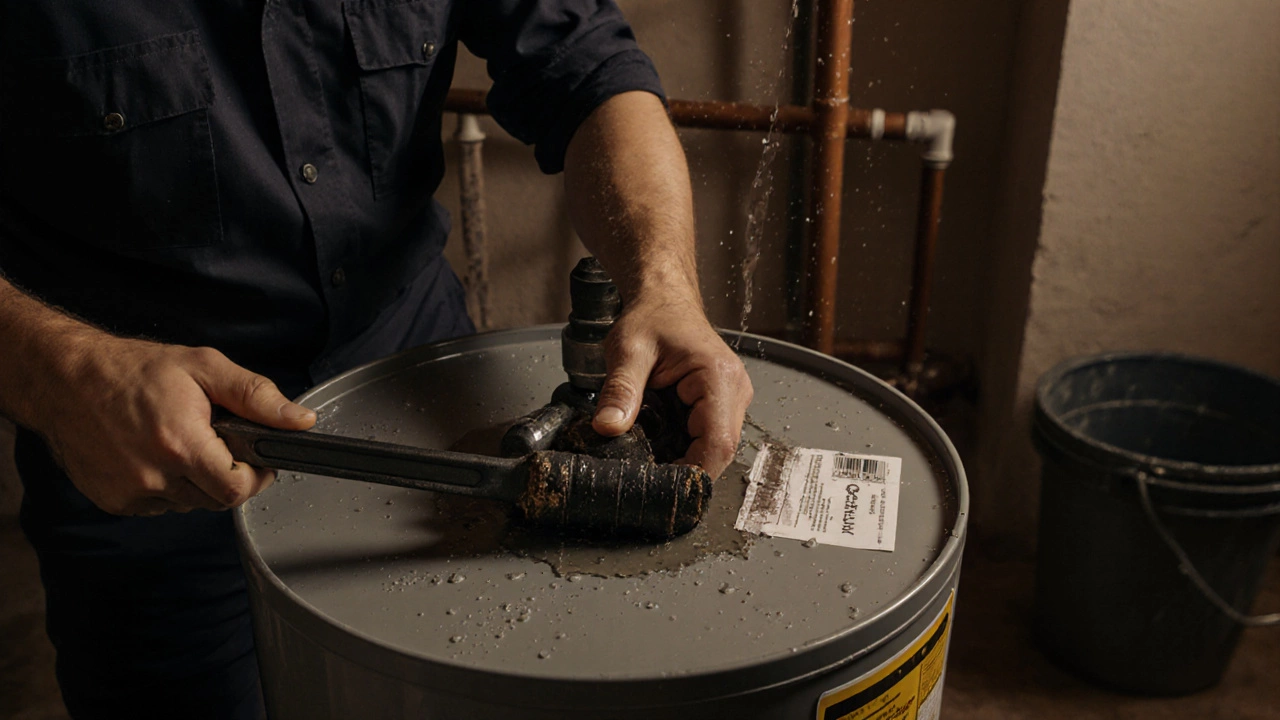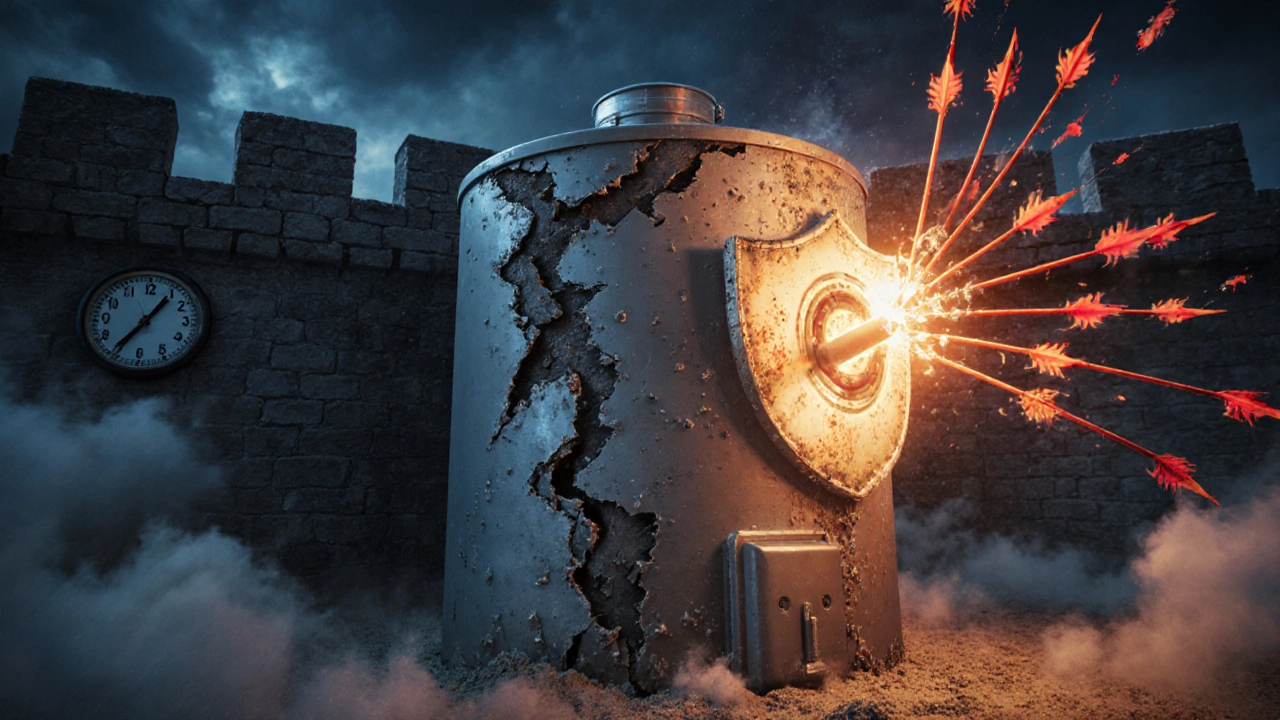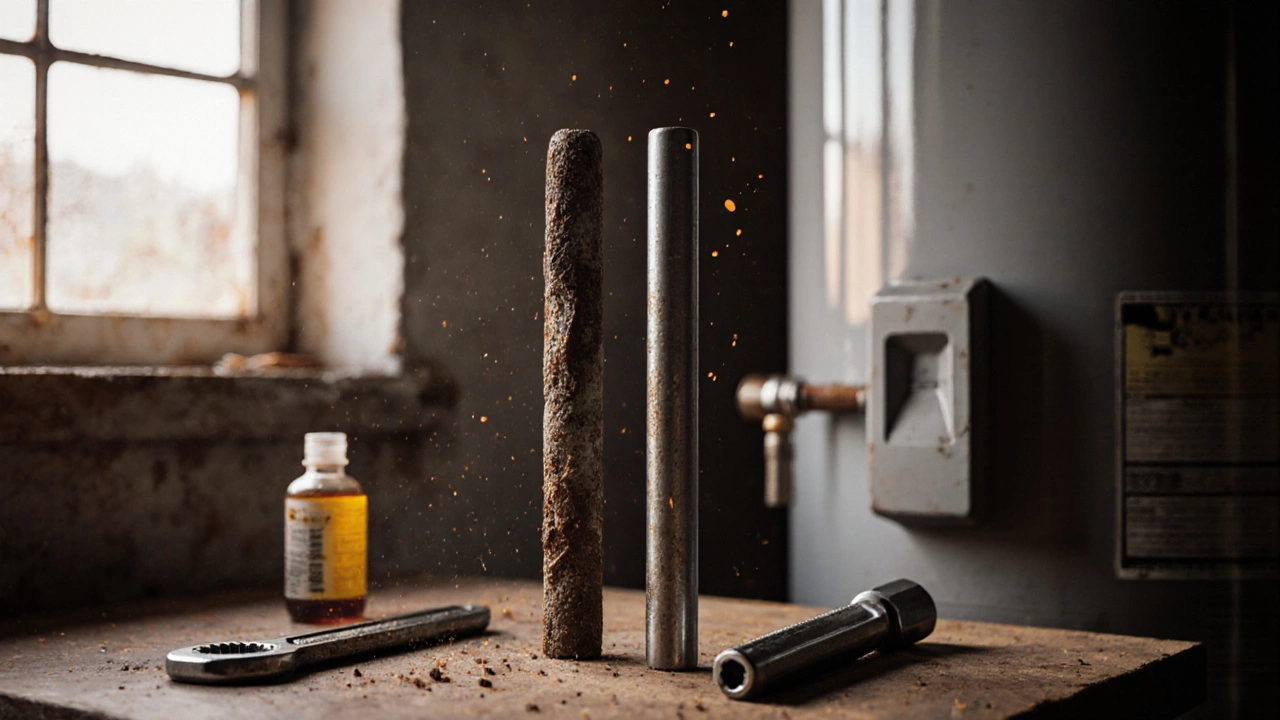Water Heater Anode Rod Cost Calculator
Estimate Your Replacement Cost
Estimated Cost Breakdown
Most people don’t think about their water heater until it stops working. But if you’ve noticed rusty water, a rotten egg smell, or your heater’s been making strange noises, the problem might not be the tank itself-it could be the anode rod. This small, cheap part is the reason your water heater lasts 10 to 15 years instead of 3. And when it goes, replacing it is one of the easiest and most cost-effective repairs you can do.
What Is an Anode Rod and Why Does It Matter?
The anode rod is a long metal stick, usually made of magnesium, aluminum, or zinc, that hangs inside your water heater tank. Its job? To attract corrosive elements in the water before they can eat away at the steel tank. Think of it like a sacrificial lamb-instead of your tank rusting out, the rod does. It’s designed to wear down over time, which is why it needs replacing.
Without a working anode rod, your tank starts corroding from the inside. Rust builds up, sediment collects, and eventually, water leaks out. That’s when you’re looking at a full tank replacement-costing $1,000 or more. Replacing the rod costs a fraction of that.
How Much Does It Cost to Replace an Anode Rod?
The total cost to replace an anode rod in New Zealand usually falls between $150 and $400. That includes both parts and labor. Here’s how it breaks down:
- Anode rod itself: $50-$120. Magnesium rods are the most common and cheapest. Aluminum rods cost a bit more and are better for hard water. Zinc rods, which help with odor, run higher.
- Labor: $100-$280. Most plumbers charge $80-$120 per hour. The job takes 1.5 to 3 hours, depending on tank access, water pressure, and sediment buildup.
- Drain and flush: Often included, but if your tank is full of sludge, extra cleaning can add $50-$80.
If you’re handy, you can buy the rod and do it yourself for under $80. But if you’ve never done it before, it’s easy to make mistakes-like not turning off the gas or electricity, or not relieving pressure, which can lead to scalding water or damaged fittings.
When Should You Replace the Anode Rod?
Most manufacturers recommend checking the anode rod every 3 to 5 years. But that’s just a guideline. Real-world conditions matter more:
- Hard water areas: If you’re in Dunedin, Oamaru, or other places with high mineral content, the rod can corrode in as little as 2 years.
- Water softeners: If you have one, it speeds up rod degradation. Check every 2 years.
- Smelly water: A rotten egg smell usually means sulfate-reducing bacteria are thriving because the anode rod is gone.
- Rusty water: Brown or orange water coming out of your hot tap? That’s tank corrosion. The rod is likely gone.
Don’t wait until your heater leaks. Once the tank starts rusting, it’s too late. The rod is the only thing standing between you and a flooded garage or basement.
DIY vs. Professional Replacement
Replacing the anode rod isn’t rocket science, but it’s messy and requires a few tools:
- Socket wrench (often 1-1/16" or 27mm)
- Long extension bar (the rod is deep inside)
- Bucket and garden hose
- New anode rod (match the type and length)
Here’s the basic process:
- Turn off the power (electric) or gas (gas heater).
- Shut off the cold water supply.
- Open a hot water tap to release pressure.
- Drain 2-3 gallons from the tank to reduce pressure.
- Locate the anode rod port-usually on top of the tank, under a cap.
- Unscrew the old rod. It’s often stuck. Use penetrating oil if needed.
- Insert the new rod and screw it in tightly.
- Refill the tank, turn on water and power/gas.
Pro tip: If the old rod is completely gone or barely there, replace it with a hybrid aluminum-zinc rod. It lasts longer in hard water and helps reduce odor.
Doing it yourself saves you $100-$300. But if your tank is in a tight space, has old fittings, or you’re not confident, hire a pro. A bad job can crack the tank or cause a leak you didn’t expect.

Signs You’re Waiting Too Long
If you’ve ignored your anode rod for more than 6 years, here’s what might be happening:
- Water smells like rotten eggs (even after flushing)
- Water is discolored, especially in the morning
- Heater takes longer to heat up
- Strange popping or cracking sounds
- Water heater is over 8 years old and has never had the rod checked
These aren’t just inconveniences-they’re warning signs. Once corrosion reaches the tank lining, no new rod will fix it. You’ll need a full replacement.
What Happens If You Don’t Replace It?
Skipping anode rod replacement is like skipping oil changes in your car. It might run fine for a while. Then one day, it just dies.
Water heater tanks are made of steel lined with glass. But that lining can crack. Once water touches the steel, rust forms. It starts small, then spreads. Sediment builds up at the bottom, reducing efficiency. Eventually, water leaks out. That’s when you’re facing:
- $1,200-$2,500 for a new water heater
- Water damage to floors, walls, or cabinets
- Insurance claims and deductibles
- Days without hot water
Replacing the rod every 3-5 years is a $150-$400 investment that protects a $1,500 appliance. It’s one of the best returns on home maintenance you’ll ever make.
What Type of Anode Rod Should You Choose?
Not all rods are the same. The right one depends on your water:
| Type | Best For | Pros | Cons |
|---|---|---|---|
| Magnesium | Soft to moderate water | Most effective corrosion protection, affordable | Can cause odor in hard water; wears faster |
| Aluminum | Hard water, areas with high mineral content | Longer lifespan, less odor | Less protective than magnesium |
| Zinc | Smelly water (rotten egg odor) | Reduces sulfur bacteria smell | More expensive, not as durable |
| Hybrid (Aluminum-Zinc) | Hard water + odor issues | Best balance for tough conditions | Higher upfront cost |
If you’re in Dunedin or another area with hard water, go with aluminum or hybrid. If you’ve had odor problems before, zinc or hybrid is your best bet.

How to Extend the Life of Your Anode Rod
Even with a new rod, you can make it last longer:
- Flush your tank annually. Drain 2-3 gallons every 6 months to remove sediment.
- Set your water heater to 50-55°C. Higher temps speed up corrosion.
- Install a water softener if your water is extremely hard-but know it’ll shorten rod life.
- Check the rod every 2-3 years, especially if you’ve had issues before.
These steps don’t cost much, but they add years to your heater’s life.
Frequently Asked Questions
Can I replace the anode rod myself?
Yes, if you’re comfortable with basic tools and safety steps. Turn off power/gas, relieve pressure, and drain some water first. The hardest part is removing the old rod-it’s often stuck. Use penetrating oil and a long socket wrench. If you’re unsure, hire a plumber. A mistake can cause leaks or damage.
How often should I replace the anode rod?
Every 3 to 5 years is standard. But if you have hard water, a water softener, or notice smelly water, check it every 2 years. The rod doesn’t last forever-it’s meant to be sacrificed. Waiting too long risks tank failure.
Why does my water smell like rotten eggs?
That smell comes from sulfate-reducing bacteria reacting with sulfur in the water. When the anode rod is gone, the bacteria thrive. A zinc or aluminum-zinc hybrid rod can help reduce this. Flushing the tank with hydrogen peroxide can also kill the bacteria, but replacing the rod is the long-term fix.
Does anode rod replacement fix low hot water pressure?
Not directly. Low pressure is usually caused by sediment buildup or clogged pipes. But if the anode rod is gone and corrosion has filled the tank with sludge, it can block the outlet. Flushing the tank after rod replacement often helps restore flow.
Is anode rod replacement covered by warranty?
Most water heater warranties cover tank defects for 6-12 years, but they don’t cover anode rod replacement. The rod is considered a maintenance item. However, some manufacturers offer extended warranties that include periodic maintenance-check your manual.
Next Steps
If your water heater is older than 5 years and you’ve never checked the anode rod, don’t wait. Grab a wrench, order a magnesium or hybrid rod online (they ship fast in New Zealand), and do it yourself. Or call a local plumber-many offer same-day service for this job.
Replacing the anode rod isn’t glamorous. But it’s the single best way to protect your water heater. For less than the cost of a new TV, you can add 5-8 years to your heater’s life. And you’ll avoid the mess, stress, and expense of a sudden leak.
